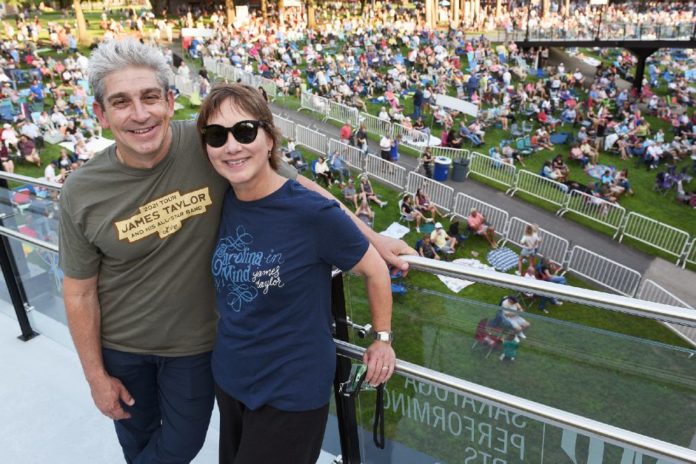
Richard Blanco belongs to a rare group of poets. He’s one of only five who have read their work at a presidential inauguration. In Blanco’s case, it was at President Barack Obama’s second inauguration in 2013.
Now, Blanco will perform at another inauguration, this time on Sept. 18 when he will read two of his poems to launch the Saratoga Performing Arts Center School of the Arts.
“The school is about interdependent disciplines: poetry, drama, music and dance, and how to learn from one year to another from each other,” Blanco said.
As to why a poet and poetry were chosen to launch the school, SPAC CEO Elizabeth Sobol said there was no other choice.
“For me, poetry is the very essence and foundation of the arts,” she said in a press release. “It is the first vehicle of human expression, before we even start to dance and sing. … It was the way of telling stories, carrying culture and memory across time and space. And in a time when language has been degraded through polarizing public discourse and the ravages of social media, it feels important to foster a love of language and a return to precision and nuance in the way we express ourselves. Poetry makes for a sensitivity to language and a resultant empathy for other beings.”
And as for why Blanco was chosen, Sobol said she knew of him from not only the Obama inaugural, but also because she and Blanco are both members of the board of the Academy of American Poets — and he’s their Education Ambassador.
“He’s an excellent and inspired educator … and his approach to life and the arts have themes of unity and love … and to bring people together for our common humanity,” she said. “I thought they seemed right for the launch of the school.”
The two poems Blanco will read at the SPAC launch — “Declaration of Interdependence” and “Looking for the Gulf Motel” — reflect that approach.
He’ll be working with 30 children ages 7 to 13 who are already part of the family and youth services that SPAC currently works with. He will visit them on one Saturday each in January and March to guide them to create a collaborative “where we’re from” poem.
This program is a bit different from what Blanco usually does with children.
“I’m not trying to make them into poets but to let them explore and have a broader exposure to learning how creativity is a powerful way of thinking and a skill you can take with you into life,” he said. “To be able to think through the lens of art to gain more clarity.”
‘Permission to write’
For Blanco, exposure to the arts came much later in life. Born in 1968 in Madrid, Spain, to parents exiled from Cuba who later moved the family to New York City, Blanco said beyond the usual poets most people read in high school, he didn’t really discover poetry until his mid-20s. By then, he’d already obtained a degree in civil engineering from Florida International University.
“I’d had an archaic sense of poetry, typically romantic,” he said. “So in my reading I was surprised and amazed by contemporary voices like Sandra Cisneros, Julia Alvarez and Martin Espada, who wrote about home and identity. Reading them gave me permission to write about my life instead of writing about daffodils.”
Inspired to learn more about the craft of writing, Blanco returned to college, worked with poet Campbell McGrath and received a master’s degree in 1997 in creative writing. His first book of poetry, “City of a Hundred Fires,” was published in 1998 to critical acclaim and explored his cultural background. Taking a break from engineering, Blanco took a job as professor of creative writing at a Connecticut college, which was followed by extensive travel and other college and workshop teaching positions.
His second book of poetry, “Directions to the Beach of the Dead,” was published in 2005, also to much acclaim. His third book, “Looking for the Gulf Motel,” was published in 2012 and received several awards.
“I’d found that poetry is a way to explore yourself and the world around you, and to ask universal questions,” Blanco said. “I’d also returned to civil engineering by day and writing poetry by night. There are not too many options as a poet.”
Then, in 2013, he got the call to read at the inauguration.
“That changed everything,” Blanco said. “I had many, many emotions: What’s an American? What does that mean? What does that look like? But the honor and privilege to create an entire poem and then read it to the country … it was very powerful. I felt I’d found a place at the table … as a child of immigrants, a gay man … it was at the heart of what I write about. It was a great feeling of being embraced and to embrace the country.”
Subsequently, he wrote two memoirs and another book of poetry. And in the past nine years, he said, he’s been active giving lectures, conducting workshops, and collaborating with musicians and orchestras.
“I’m living the dream. I’m earning a living as a poet,” Blanco said.
Writer to teacher
He’s also learned a great deal about how to teach poetry and what he’ll be trying to do with the SPAC children and the three high school students he’ll be virtually mentoring in the spring who will get to read their poetry at a SPAC festival scheduled for June 5.
To write a good poem, the writer “must have something they’re passionate about so the poem will have an emotional center. Something must be at stake. They just can’t blurt out words but use the craft to explore the emotion. It’s the hardest thing to teach. The students must learn to be vulnerable.”
Even now, Blanco said, he continues to read a lot of poets, especially the Latin ones who “feel like family to me.”
“The core of a poem is its imagery and the sensory details. To be able to explain what it is the poet is talking about. Inspiration can be from Robert Frost or Walt Whitman and the classics … they’re all talking about emotion,” he said.
He scoffs at the idea that one can’t find a favorite poet or that some people don’t like poetry.
“There are so many poets in America and they’re writing so differently, and about so many things. You just need to find the one you like and grow as a reader,” he said. “Poetry is analogous to music. It’s like finding that right band.”
Despite his experience writing poetry, he still revises and pores over his material.
“Each poem finds its own parameter and aesthetic. It’s a real challenge,” Blanco said. “Work never ends. Students have to learn that poems don’t fall out of the sky. There is inspiration, but it takes a lot of craft and trial and error. I’m still challenged. It’s just that now I know when a poem is going bad sooner.”
More from The Daily Gazette:
Categories: Life and Arts







